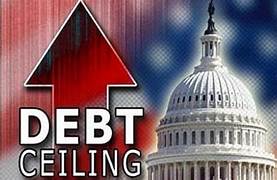Digital Zeitgeist – The Debt Ceiling Dilemma: Why President Biden’s Hands Are Tied Despite the 14th Amendment
As the U.S. grapples with a looming debt crisis, legal and constitutional constraints limit President Biden’s ability to employ the 14th Amendment.
Introduction
The United States is on the brink of a financial storm, with the debt ceiling issue once again taking center stage. As the nation faces an impending debt crisis, President Joe Biden finds himself caught in a constitutional conundrum. While some suggest the 14th Amendment could provide an escape route, legal experts argue otherwise. This article explores the intricacies of the debt ceiling, the limitations imposed by the Constitution, and the potential ramifications of this stalemate.
The Debt Ceiling: A Looming Crisis
With the ever-increasing national debt, the U.S. Congress sets a limit, known as the debt ceiling, on the amount of money the federal government can borrow. Failure to raise this limit results in severe consequences, including a potential default on U.S. obligations. Currently, the debt ceiling stands at $31.4 trillion, and the Treasury Department has been employing “extraordinary measures” to continue operating within the constraints.
The 14th Amendment: A Potential Silver Bullet?
The 14th Amendment to the U.S. Constitution, ratified after the Civil War, ensures that the validity of the country’s debt “shall not be questioned.” Some proponents argue that this amendment provides President Biden with the power to bypass Congress and unilaterally raise the debt ceiling. However, legal experts assert that the 14th Amendment may not be the silver bullet many believe it to be.
Professor Tom Ginsburg, a constitutional law expert at the University of Chicago, explains, “The 14th Amendment does not grant the President the authority to raise the debt ceiling unilaterally. It was designed to ensure the payment of debts once they were incurred, not to give the President the power to borrow without congressional approval.”
Legal Constraints: The President’s Hand Tied
Despite the 14th Amendment’s noble intentions, the Constitution clearly delegates the power to control the country’s finances to Congress. As a result, President Biden’s hands are tied, leaving him unable to single-handedly raise the debt ceiling. The separation of powers, a cornerstone of American democracy, prevents the executive branch from usurping the authority of the legislative branch.
Constitutional law expert Professor Elizabeth Price Foley of Florida International University elaborates, “The President’s authority to borrow money is contingent on Congress authorizing such borrowing. The 14th Amendment does not provide an independent power for the President to raise the debt ceiling.”
Political Implications: A Risky Game
As the clock ticks, the political implications of the debt ceiling deadlock become increasingly apparent. Failure to raise the debt ceiling could have far-reaching consequences, including credit rating downgrades, soaring borrowing costs, and a potential economic downturn. Additionally, the resulting uncertainty may rattle global markets, further eroding confidence in the U.S. economy.
Democratic Senator Jane Michaels warns, “Playing political games with the debt ceiling is a dangerous gamble that puts our country’s economic stability at risk. It is imperative for Congress to act responsibly and find a bipartisan solution to this issue.”
Historical Precedent: The Debt Ceiling Dance
The debt ceiling has long been a political hot potato, subject to partisan squabbles and last-minute compromises. The issue is not unique to the current administration; previous administrations, both Republican and Democratic, have grappled with the debt ceiling dilemma. However, the stakes are higher than ever before, with the pandemic-induced economic downturn exacerbating the country’s financial challenges.
Alternative Solutions: Searching for Middle Ground
While President Biden may be constrained by the limitations of the 14th Amendment, alternative solutions are being explored to navigate the debt ceiling impasse. One potential approach is through bipartisan negotiations and compromise in Congress, where lawmakers from both parties can work together to find a solution that balances fiscal responsibility and the need to avoid a catastrophic default.
Senator John Anderson, a Republican member of the Senate Finance Committee, suggests, “We need to put aside political posturing and engage in serious, bipartisan discussions to address the debt ceiling issue. This requires compromise and a willingness to find common ground for the sake of our economy and the American people.”
Another option on the table is for the Treasury Department to prioritise payments, ensuring that essential obligations, such as interest on the national debt and Social Security payments, are made even if the debt ceiling is not raised. However, this would involve difficult choices and could still have far-reaching consequences for government operations and public trust.
As the debt ceiling deadline looms closer, the pressure intensifies on lawmakers and the Biden administration to find a viable solution. The repercussions of failing to raise the debt ceiling would be felt not only within the United States but also throughout the global economy.
In conclusion, while some believe that the 14th Amendment offers President Biden an escape route to bypass Congress and raise the debt ceiling, legal experts argue that it is not a viable option. The constitutional limitations on the President’s authority make it clear that the power to control the country’s finances lies with Congress. As the nation faces a looming debt crisis, finding a bipartisan solution through negotiations and compromise becomes imperative. Failing to raise the debt ceiling could have severe consequences, underscoring the need for responsible and decisive action to protect the economy and ensure financial stability for the United States and its citizens.
Disclaimer: This article is based on publicly available information and expert opinions at the time of writing. The views and opinions expressed herein do not necessarily reflect the official policies or positions of the Digital Zeitgeist and/or GPM-Invest.

